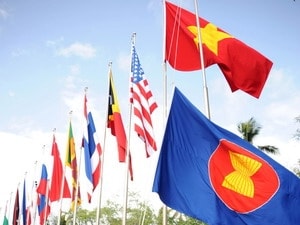The 44th AMM Conference agreed on many important issues.
The 44th ASEAN Foreign Ministers' Meeting (AMM 44) with the theme "ASEAN Community in the Global Community of Nations" ended on the afternoon of July 19 in Bali, Indonesia.
AMM is one of the most important annual activities of ASEAN Foreign Ministers to review the results achieved in implementing the Roadmap for ASEAN Building and Development, and discuss measures to enhance ASEAN's capacity to play a leading role in the region.

Raising the ASEAN flag and other countries' flags at the conference venue. (Photo: AFP/VNA)
In this spirit, during the one-day working session of the Conference, ASEAN Foreign Ministers had substantive and effective discussions and reached consensus on many important issues related to enhancing connectivity, cooperation, solidarity, and capacity building of ASEAN, towards the goal of building an outward-looking, peaceful, stable, prosperous, people-oriented and democratic ASEAN Community by 2015; promoting ASEAN cooperation with Partners to enhance the assurance of peace, security, stability and prosperity in the region as well as in the world.
At the 44th AMM, ASEAN Foreign Ministers focused on discussing important priority issues of ASEAN and the region; highlighting the important role of effectively implementing the ASEAN Connectivity Master Plan in the process of building the Community and creating a foundation for expanding connectivity in East Asia.
In order to raise awareness of ASEAN and the Community building process, thereby creating a sense of Community, the Ministers agreed that ASEAN countries will fly the ASEAN flag next to the national flag at all their diplomatic missions starting from “ASEAN Day” on August 8, 2011.
The Ministers agreed to accelerate the ASEAN integration process based on effectively promoting the building of three pillars, including the ASEAN Political-Security Community (APSC), the ASEAN Economic Community (AEC) and the ASEAN Socio-Cultural Community (ASCC); giving priority to issues of food security, energy security, water security, especially clean water; further enhancing the capacity to take advantage of opportunities, effectively dealing with regional and global challenges, including resolving disagreements among ASEAN member countries in the spirit of the ASEAN Treaty of Amity and Cooperation (TAC), peacefully resolving disputes between member countries and non-ASEAN countries through dialogue and negotiation.
Discussing cooperation with Partners and the evolving regional structure, the Ministers agreed that ASEAN needs to continue to proactively and actively promote the building of a regional structure with ASEAN playing a central role and based on existing regional cooperation processes and mechanisms such as ASEAN+1, ASEAN+3, EAS, ARF, ADMM+... to contribute more effectively to peace, stability, security and development in the region.
The Ministers emphasized the need to expand and deepen relations with Partners, encourage Partners to participate and actively contribute to common cooperation in the region as well as address emerging challenges.
Regarding the East Sea issue, ASEAN Foreign Ministers expressed concern over recent complicated incidents in the East Sea; stressed the importance of ensuring peace, stability, security and maritime safety; resolving disputes between relevant parties by peaceful means; respecting the principles of international law, especially the 1982 United Nations Convention on the Law of the Sea (UNCLOS) and the spirit of the Declaration on the Conduct of Parties in the East Sea (DOC).
The foreign ministers affirmed the importance of promoting a peaceful, friendly and harmonious environment in the East Sea between ASEAN and China to ensure peace, stability, economic growth and prosperity in the region; stressed that the DOC is an important collective commitment between ASEAN member countries and China to ensure peaceful settlement of disputes in the region, in accordance with UNCLOS; and called on all parties to respect freedom of navigation and overflight in the East Sea in accordance with the principles recognized by international law.
The Ministers discussed the completion of guidelines for implementing the DOC so that the two sides can move to a new phase, which is to determine the basic contents of the Code of Conduct of Parties in the East Sea (COC).
Emphasizing the implementation of the decision of the 18th ASEAN Summit (May 2011), the Ministers agreed to assign ASEAN Senior Officials (SOM) to initiate consultations within ASEAN on the development of the COC and report the results on the occasion of the 19th ASEAN Summit later this year; welcomed the new draft of the ASEAN SOM on the Guidelines for the Implementation of the DOC and hoped that ASEAN and China could reach an agreement and complete this Code on the occasion of the bilateral SOM meeting on July 20, 2011; and hoped to complete the content of the COC before the 19th ASEAN Summit and related summits based on the momentum of celebrating the 20th anniversary of the establishment of ASEAN-China dialogue relations this year.
The Ministers also stressed the importance of implementing a second monitoring mechanism on what is happening in the South China Sea, such as the regular workshop on managing potential conflicts in the South China Sea hosted by Indonesia, which can encourage cooperation, strengthen trust and mutual understanding among relevant parties.
According to VNA

.png)






